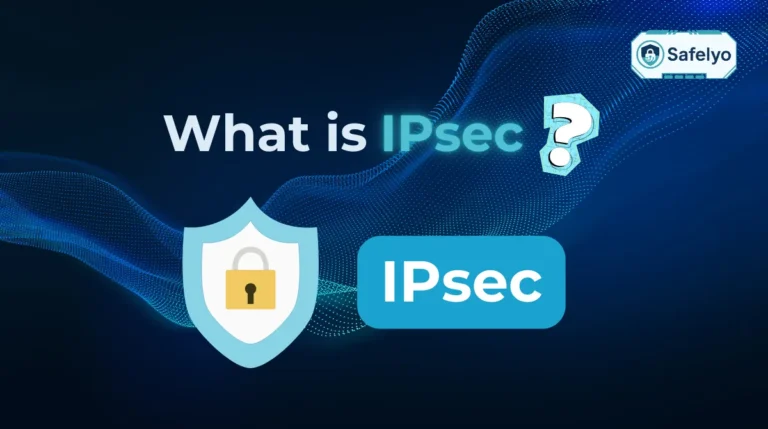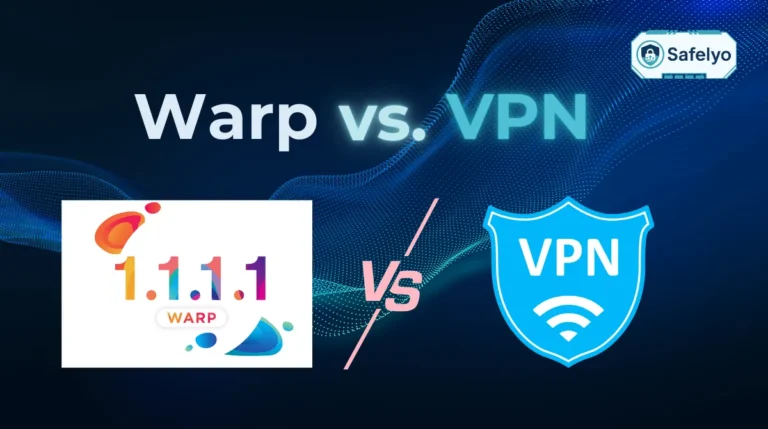You’ve probably heard the term ‘IP address,’ but then things get complicated: What is a static IP address? Static, Dynamic, Public, Private. It’s enough to make anyone’s head spin. A static IP address can be thought of as a permanent, unchanging home address for your network on the Internet. This means that your device will always have the same IP address, making it easier for other devices and services to locate and communicate with you.
In today’s digital world, the type of address your network uses determines what’s possible – from hosting a reliable game server to securely accessing your office network from home. The wrong type can lead to frustrating connection issues and potential security oversights.
As a network administrator with over a decade of experience setting up home and small business networks, I’ve seen countless users struggle with this exact issue. Understanding the difference isn’t just for IT experts; it’s a fundamental step for anyone who wants to build a more powerful and reliable home or office network.
In this comprehensive guide, you’ll discover:
- The main distinction between a static IP and a dynamic IP can be easily clarified.
- A simple “address” analogy to make it all clear.
- The real-world benefits of gaming, remote access, and business.
- A clear checklist to help you decide if you actually need one.
Don’t let networking jargon stand in your way. Let me demystify the world of IP addresses and help you make a confident choice for your connection.
1. Static IP vs. Dynamic IP explained
To truly understand what is a Static IP address, we need to start with the basics. I’ve always found the best way to explain this is to forget about technology for a moment and think about real-world addresses.
An IP address is simply your device’s unique address on the internet, allowing other devices to find and communicate with it. But not all addresses are the same.
1.1. Dynamic IP
This is what over 99% of home internet users have. Think of a Dynamic IP address like staying in a hotel. Each time you connect to the internet (or restart your router), your Internet Service Provider (ISP) assigns you a temporary, random room number (a Dynamic IP) from their available pool. When you leave, that room number is given to the next guest.
The Benefit
This is very cost-effective for the ISP to manage and offers you a slight privacy boost, as your address is always changing, making you a “moving target.”
The Drawback
It’s impossible to reliably host services or access your network from afar. Telling a friend to meet you at your hotel is useless if you don’t know what room you’ll be in tonight.
>> Curious about how your ISP assigns these addresses? Learn more in our detailed guide on what DHCP is and how it works.
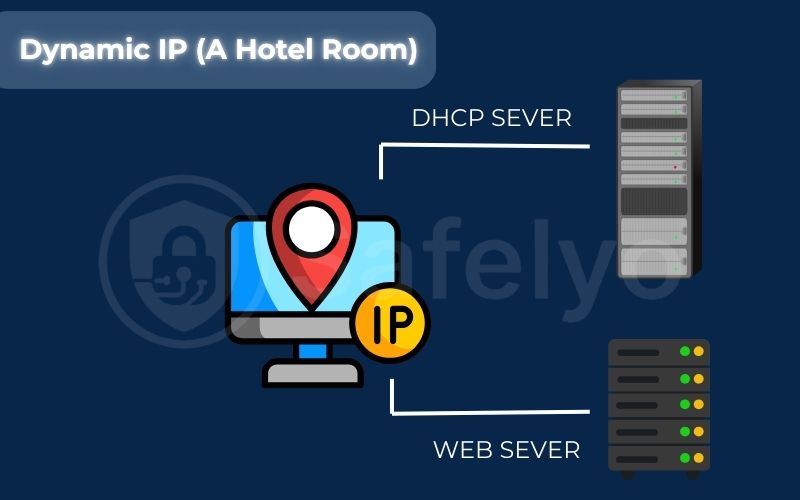
1.2. Static IP
A Static IP address, on the other hand, is like owning a house with a permanent, unchanging street address. Your ISP assigns this specific IP address to you, and it never changes unless you cancel your service or request a new one.
The Benefit
It provides a reliable, consistent location that other services can always find. This is the core of the benefits of Static IP. If you want to host a game server or access your security cameras, you need an address that stays put.
The Drawback
It almost always costs extra. And because your address is public and fixed, it can be a more visible target for hackers if not properly secured with a good firewall.
>> Considering whether a static IP is the right choice for you? See how it differs from a VPN’s dedicated IP in our expert comparison.
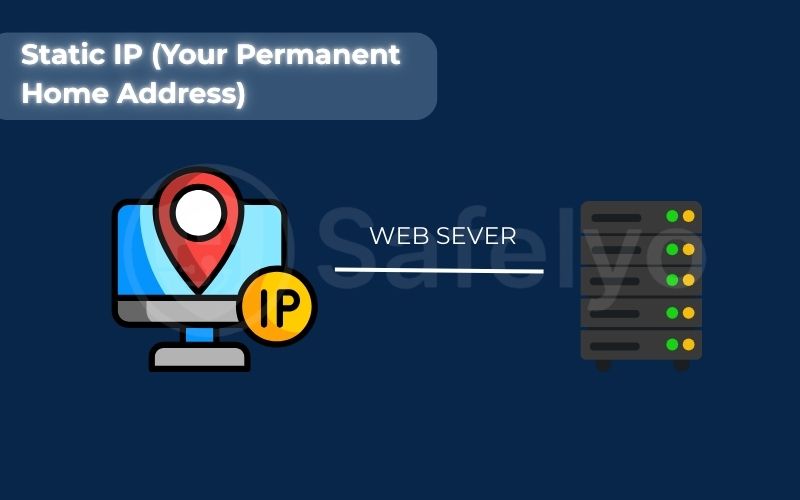
To summarize the Static IP vs Dynamic IP debate, here’s a quick visual guide:
| Feature | Dynamic IP (Hotel Room) | Static IP (Home Address) |
| Stability | Changes periodically (e.g., on router reboot) | Never changes |
| Cost | Included in your standard internet plan | Usually, there is an extra monthly fee from your ISP |
| Ease of Use | Automatic. No setup required. | May require manual configuration in your router. |
| Security | Slightly more private (moving target) | A fixed target, but easier to secure with a specific firewall rule. |
| Best For… | Every day, browsing, streaming, and casual use. | Hosting servers, reliable remote access, and serious online gaming. |
2. The ultimate IP showdown: A visual guide
The hotel vs. home analogy gives a great high-level overview. Now, let’s put the core features of the Static IP vs Dynamic IP debate into a simple, visual format. When I’m explaining this to someone, seeing the direct comparison is often what makes the choice click.
| Feature | Dynamic IP (The Hotel Room) | Static IP (The Home Address) |
| Stability | Changes Periodically Your address is temporary and can change when your router reboots. | Never Changes Your address is permanent and reliably yours. |
| Cost | Included in Your Plan This is the standard, cost-effective option from your ISP. | Usually, an Extra Monthly Fee You pay a premium for this dedicated resource. |
| Ease of Use | Automatic (No Setup) Your ISP handles everything for you via DHCP. | May Require Manual Configuration You may need to input the IP settings into your router. |
| Security | Slightly More Private You’re a moving target, making you harder to track over time. | A Fixed Target Easier to secure with a firewall, but your address is public and constant. |
| Best For… | Every day browsing, streaming, and casual online activities. | Hosting servers (web, game, file), reliable remote access, VoIP phones, and serious online hosting. |
This visual guide makes the trade-offs clear. A Dynamic IP address offers convenience and a degree of obscurity, while a Static IP address provides the stability and reliability needed for more advanced networking tasks.
3. When do you actually need a Static IP?
For the vast majority of internet users, a Dynamic IP is perfectly fine. It handles streaming, browsing, and casual gaming without any issues. However, if you’ve ever felt frustrated by a networking problem you couldn’t solve, a Static IP address might be the key.
From my experience setting up networks for gamers, remote workers, and small businesses, the need for a Static IP almost always boils down to one simple requirement: You need other devices on the internet to be able to reliably find and initiate a connection to your network.
Use this simple checklist. If you check ‘Yes’ for any of these questions, you should seriously consider getting a Static IP address.
| Do you… | Yes |
| Host a server at home? (e.g., a website, a file server (NAS), or a game server for Minecraft or Valheim) | ☐ |
| Need reliable remote access? (e.g., to connect to your home PC from work, or view your home security cameras from your phone) | ☐ |
| Consider yourself a serious online gamer? (e.g., you need a more stable connection or want to host your own game lobbies/servers) | ☐ |
| Use a VoIP (Voice over IP) phone system? (Common for home offices and small businesses) | ☐ |
| Need to access a work network that requires an allowlisted IP? (Your IT department would tell you if this is a requirement) | ☐ |
4. How to get a Static IP address
If you have reviewed the checklist and concluded that a Static IP address is the best option for you, the following question arises: How can you obtain a Static IP? Unlike a Dynamic IP, which is assigned automatically, a Static IP is a premium service that usually requires a formal request.
Here is the standard process I walk my clients through.
Step 1: Contact your Internet Service Provider (ISP)
This is the most straightforward and prevalent approach. You’ll need to call your ISP’s customer support line. My advice is to try to get routed to their business or technical support department, as the frontline sales reps might not be as familiar with this request.
Simply ask them: “Do you offer Static IP addresses for residential/business plans?” Most major ISPs do, but it might depend on the specific internet package you have.
Step 2: Inquire about the cost
Be prepared for an extra monthly fee. A static IP is a finite resource that ISPs need to oversee, which is why they impose a charge for it.
The ISP Static IP cost can vary widely, but in my experience, it typically ranges from $5 to $20 per month on top of your existing internet bill. Be sure to ask if there are any one-time setup fees as well.
Step 3: Follow their instructions for configuration
Once you’ve signed up, the ISP will provide you with the necessary network information. This usually includes:
- Your new Static IP address
- The Subnet Mask (e.g., 255.255.255.0)
- The Gateway (your router’s address)
- DNS server addresses
They will then guide you on how to enter this information into your router’s administration settings. In some cases, they can provision it remotely, and all you’ll need to do is restart your router.
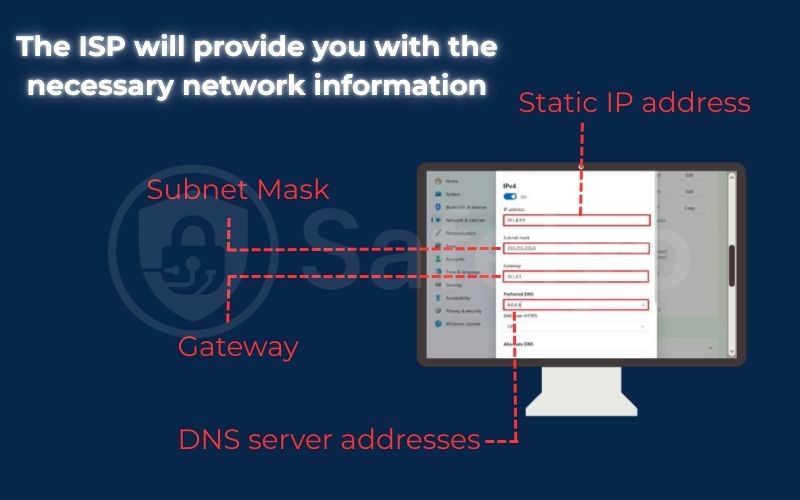
Alternative: Use a VPN with a Dedicated IP
This distinction is significant. For certain situations, a VPN that provides a “Dedicated IP” feature can serve as an easier alternative. This option grants you a Static IP address specifically for your VPN traffic. It’s ideal if you require a stable IP for a particular application without altering your entire home network. However, this differs from obtaining a Static IP for your entire home network from your ISP.
5. Static IP vs. Dedicated IP and Public vs. Private
The world of IP addresses is a minefield of confusing, overlapping terms. As an IT professional, I’ve seen these terms misused constantly, even by tech-savvy users. Getting them straight is essential to understanding your network. Let’s clear the air once and for all.
5.1. Public vs. Private IP Address: Your Network’s Two Addresses
This is the most fundamental distinction, best understood with our address analogy. A public IP is your building’s street address, while private IPs are the individual apartment numbers inside.
| Feature | Public IP Address | Private IP Address |
| Analogy | Your Street Address | Your Apartment Number |
| Scope | Global (The Internet) | Local (Your Home/Office Network) |
| Purpose | Identifies your entire network to the outside world. | Identifies a specific device within your local network. |
| Example | 8.8.8.8 (Google’s DNS) | 192.168.1.101 (Your PC) |
| Provided By | Your Internet Service Provider (ISP) | Your Router (via DHCP) |
The crucial connection
When you obtain a Static IP from your ISP, you receive a static PUBLIC IP. In contrast, when you follow instructions to manually set an IP address on your Windows PC, you are configuring a static PRIVATE IP.
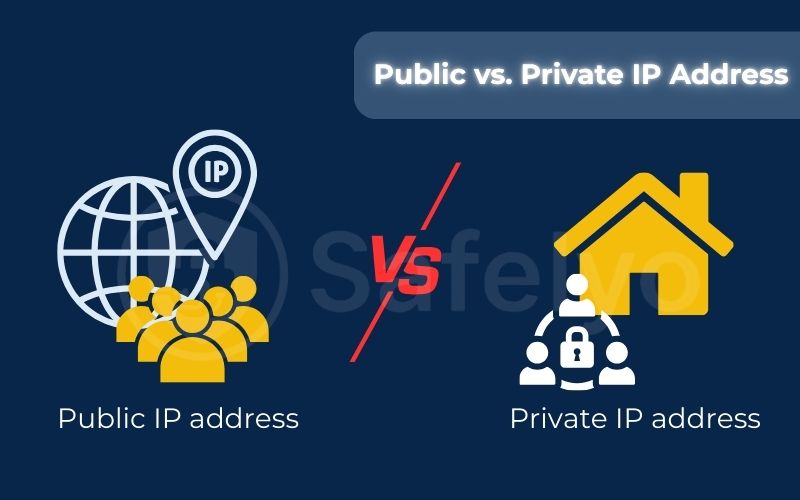
5.2. Dedicated IP vs. Static IP: A Matter of Context
This is another major point of confusion, and it mostly comes down to marketing and context. A “dedicated IP” is a product feature, while a “Static IP” is a technical property.
| Feature | Static IP (from your ISP) | Dedicated IP (from a VPN/Host) |
| Core Concept | A technical term for an IP address that does not change. | A product feature for an exclusive, Static IP address. |
| Provider | Your Internet Service Provider (ISP). | Your VPN or Web Hosting company. |
| What It Applies To | Your entire home/office network connection. | Only the traffic going through that specific service. |
| Relationship | A Dedicated IP is a type of Static IP. | This is a specific use case of a Static IP, sold as a feature. |
The key point in the discussion of dedicated IP versus Static IP is this: the Static IP provided by your ISP is inherently dedicated to your home network. The phrase “Dedicated IP” is utilized by VPN and hosting providers to market a Static IP for their particular service.
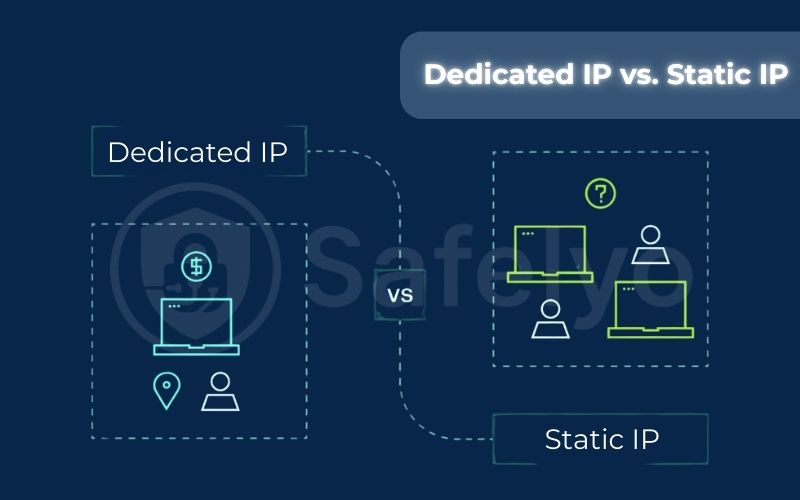
6. FAQ about the Static IP address
We’ve covered the analogies and use cases, but you might still have a few specific questions. Here are clear responses to the most frequently asked questions regarding static and dynamic IP addresses.
What is a Static IP address?
A static IP address is a permanent, fixed numeric address assigned to a device or network on the Internet. Unlike a Dynamic IP, which is temporary and changes periodically, a Static IP provides a consistent and reliable point of connection, much like a permanent home address.
How do I know if my IP is static?
The easiest way to determine how to find my IP address type is to perform a simple test. First, visit a site like whatismyip.com and write down your public IP address. Then, unplug your main internet modem/router for at least 30 seconds. Plug it back in, wait for it to reconnect, and check the website again. If the IP address is the same, you have a Static IP. If it has changed, you have a dynamic IP address.
Is it better to use a Static IP or DHCP?
This question contrasts two distinct concepts. A Static IP is a manually set, unchanging address, while DHCP (Dynamic Host Configuration Protocol) is an automated system that assigns Dynamic IP addresses.
For typical home use, DHCP is preferable due to its automation and lack of setup requirements. However, for a server or device that needs a stable address, a Static IP is the superior choice.
Is a Static IP better for gaming?
A Static IP for gaming can be better, but not because it’s faster. Its main benefit is stability. It can provide a more reliable connection for some peer-to-peer games and is often necessary if you want to host your own game server or lobbies for friends to join directly.
What is a Static IP in VPN?
In the context of a VPN, a Static IP is often referred to as a “dedicated IP.” This premium feature allows the VPN provider to assign you a static, unchanging IP address exclusively for your VPN traffic. This is beneficial for accessing services that need a consistent IP, but it differs from the Static IP provided by your ISP for your entire home network.
Is a Static IP less secure?
It can be. Because your address is fixed and public, it gives hackers a constant, predictable target for automated scans and attacks. However, this risk is easily mitigated by using a good firewall on your router and computer. A strong firewall ensures that even if your address is known, only authorized connections can get through.
Can I get a Static IP for free?
It’s very rare. Most ISPs charge a monthly fee for a Static IP address, as it’s a limited resource they have to manage carefully. The ISP Static IP cost is an additional charge on top of your standard internet plan.
7. Conclusion
The choice between a Static IP vs. Dynamic IP comes down to your specific needs. There is no single “better” option, only the right option for you. For the vast majority of users, the Dynamic IP assigned by your ISP is the perfect, hassle-free solution.
- A Dynamic IP (like a hotel room) is what most people have and is perfect for everyday browsing.
- A Static IP (like a home address) is an unchanging address ideal for hosting servers, reliable remote access, and gaming.
- You usually need to request and pay for a static IP address from your ISP.
- Use our checklist to determine if the benefits of a Static IP are worth the cost for your situation.
By understanding the simple difference between these address types, you’re empowered to build a home or office network that is more stable, reliable, and perfectly suited to your goals. Whether you use a static or Dynamic IP, protecting your connection with a robust firewall is essential. Learn more in the Privacy & Security Basics library of Safelyo.


